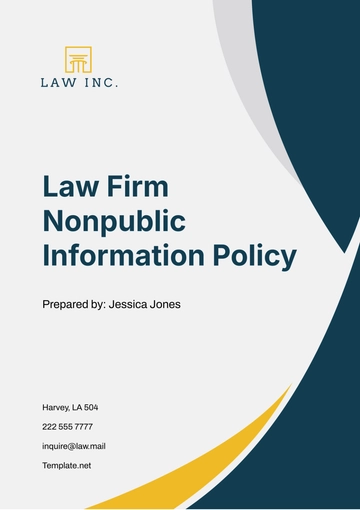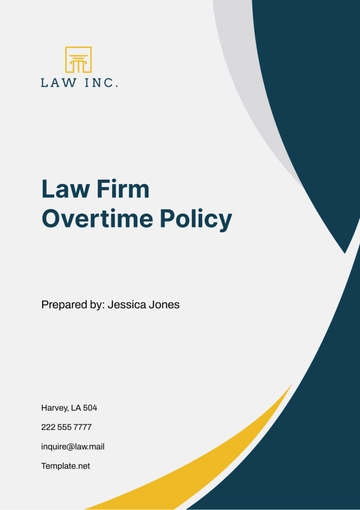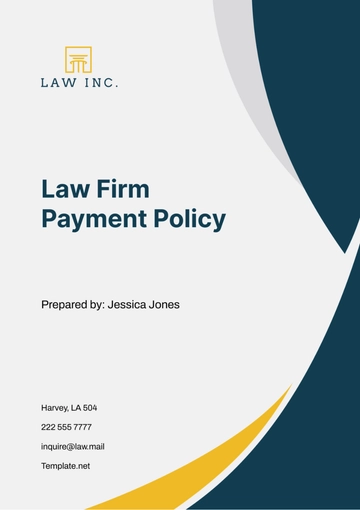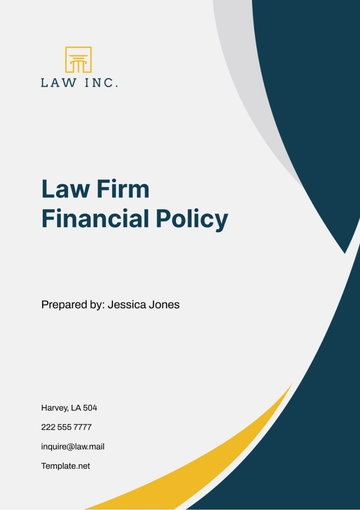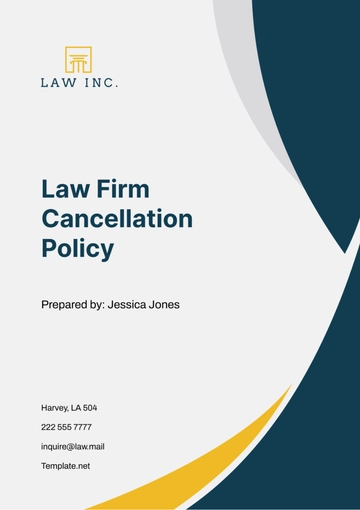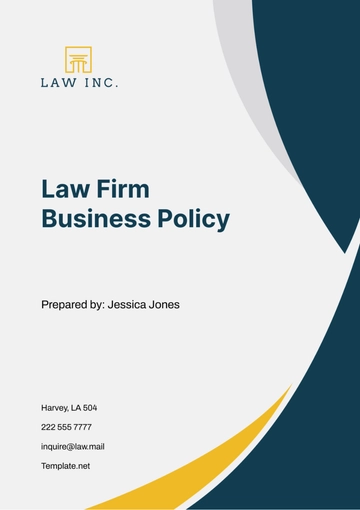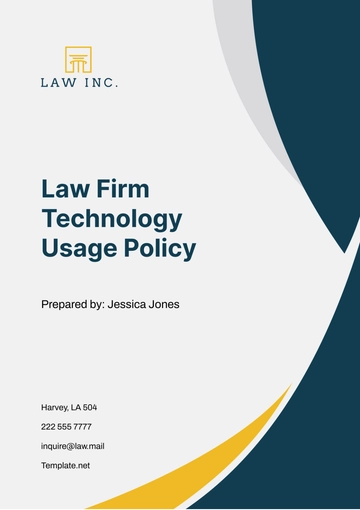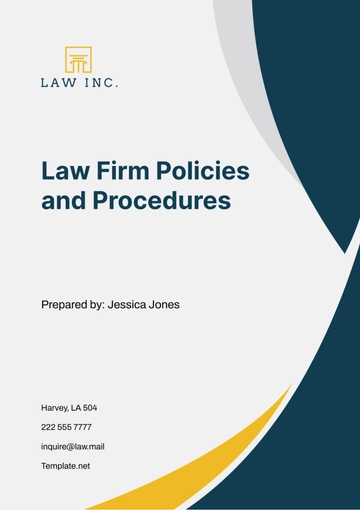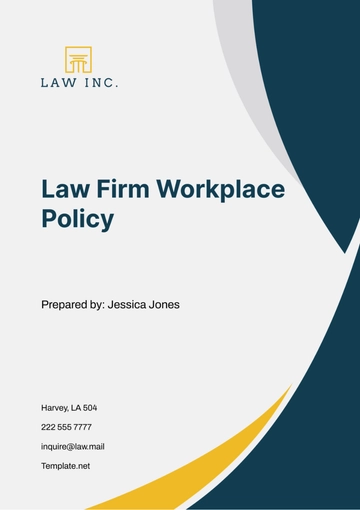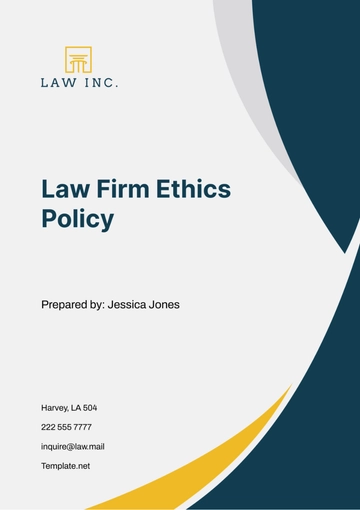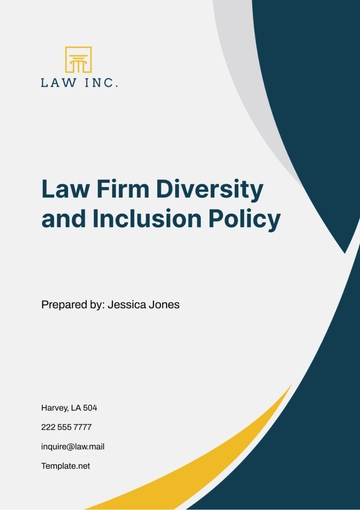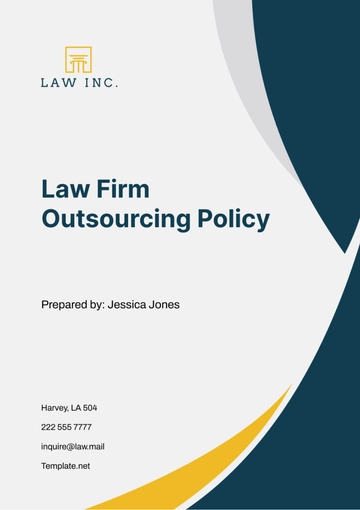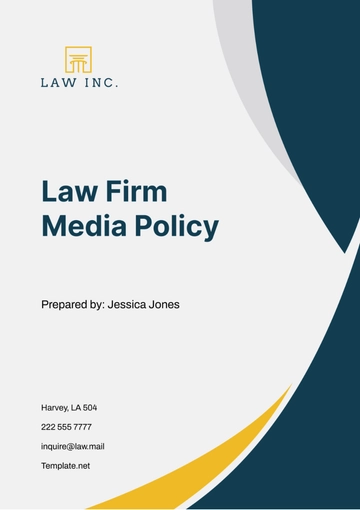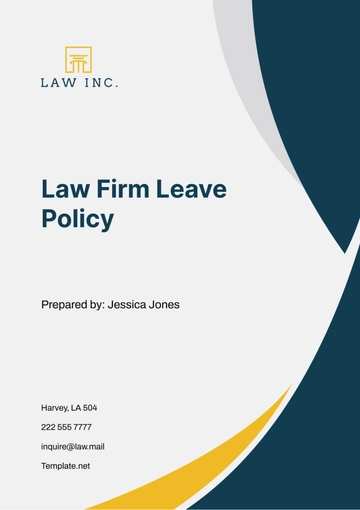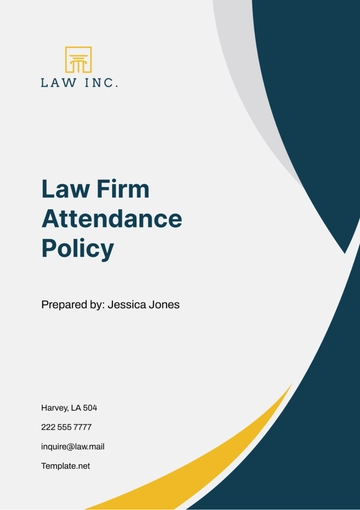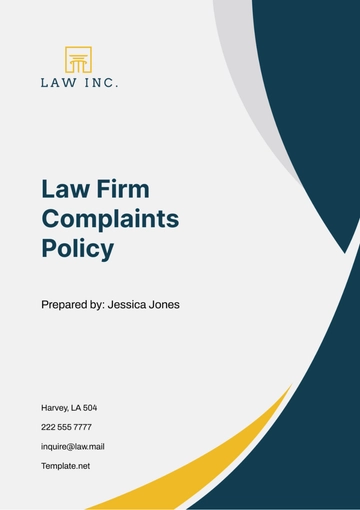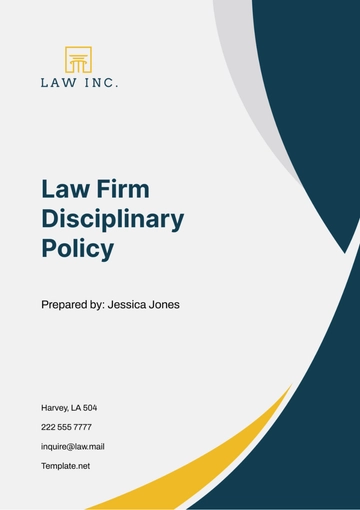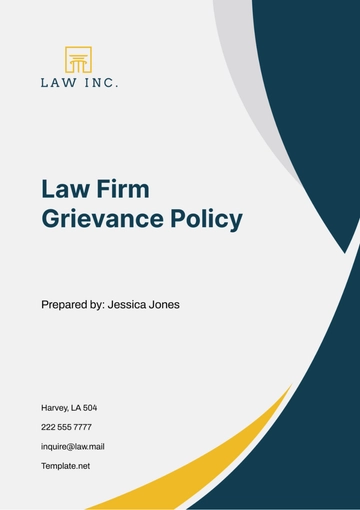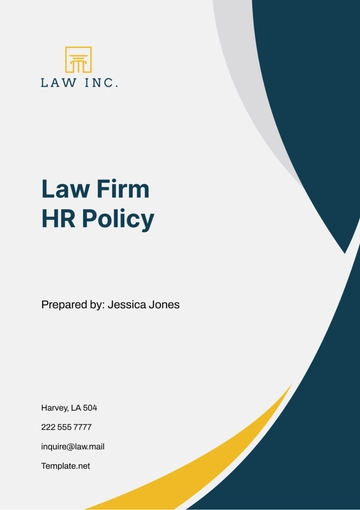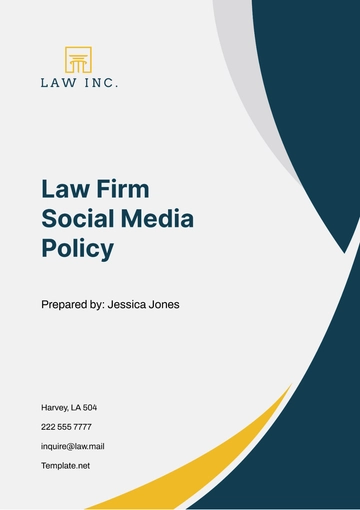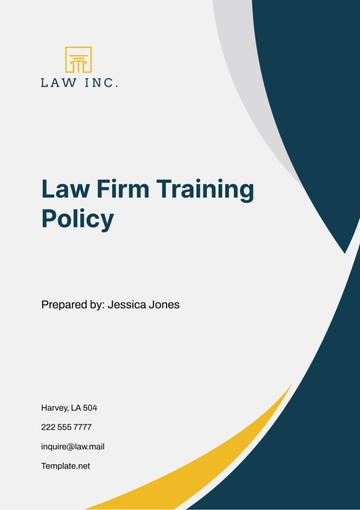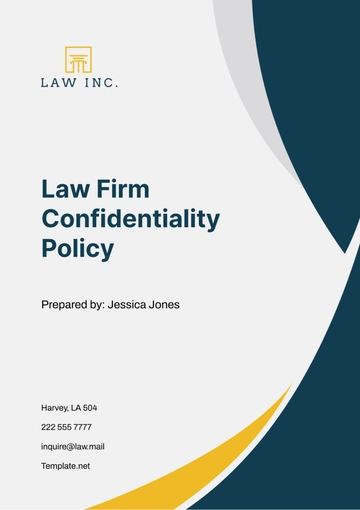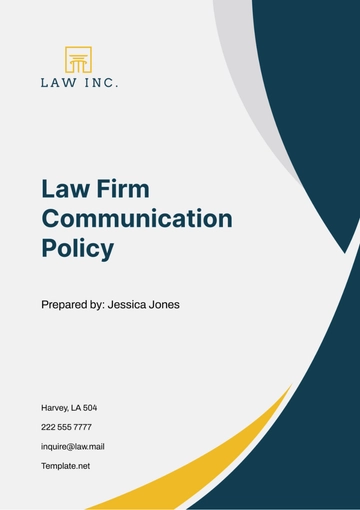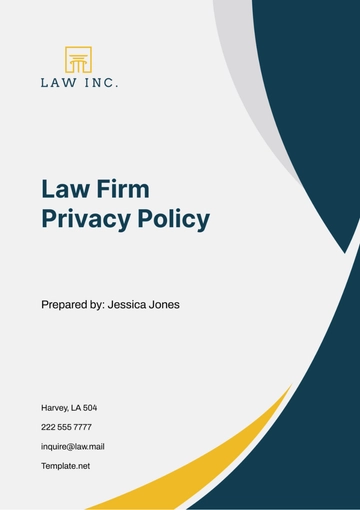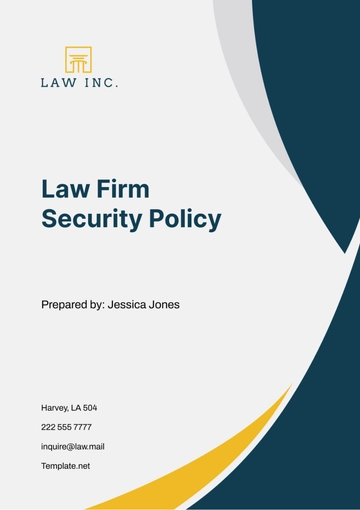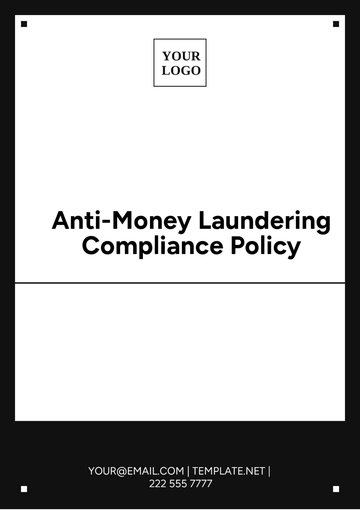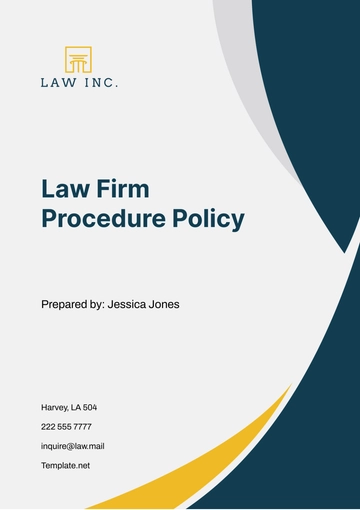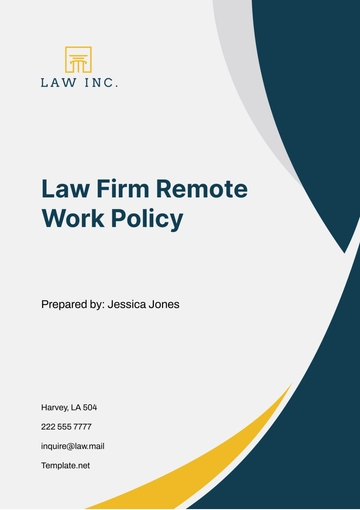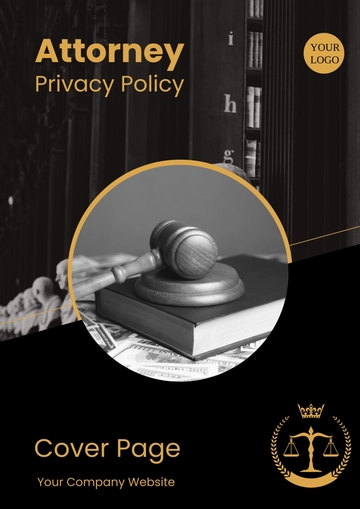Free Law Firm Business Policy
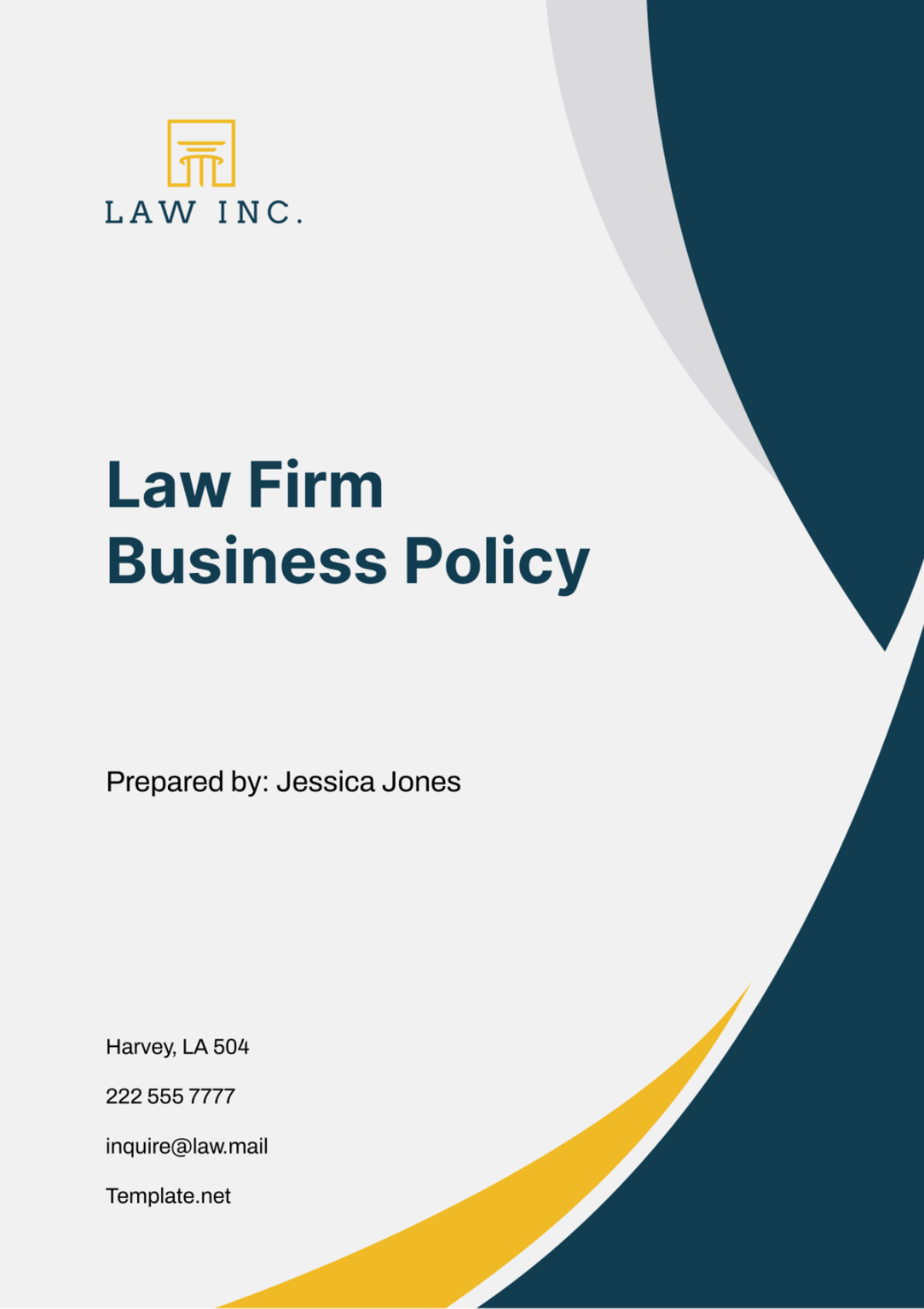
1. Introduction
Purpose
The purpose of this Business Policy is to provide a cohesive guideline that ensures operational efficiency, ethical integrity, and compliance with applicable laws and regulations. This policy is designed to support our mission and assist our personnel in making informed decisions.
Scope
This policy applies to all employees, partners, and affiliates of [Your Company Name]. Compliance is mandatory, and all personnel are required to familiarize themselves with these guidelines and adhere strictly to them.
2. Firm Overview
Mission Statement
[Your Company Name] is committed to delivering outstanding legal services that consistently exceed our clients' expectations. We strive to uphold the highest standards of integrity and professionalism in all our dealings.
Values and Principles
Integrity: Upholding the highest standards of honesty and ethical behavior.
Excellence: Striving for superior performance and continuous improvement.
Accountability: Taking responsibility for our actions to clients and each other.
Respect: Valuing diversity and unique contributions, fostering a trusting, open, and inclusive environment.
Teamwork: Working collaboratively to achieve collective and individual goals.
3. Professional Standards
Code of Conduct
All employees, regardless of position, are expected to exhibit behavior that reflects the values of [Your Company Name], including integrity, excellence, and respect. Specific behaviors expected include punctuality, responsiveness to client needs, and professional decorum in all interactions. Prohibited behaviors include any forms of harassment, discrimination, and any actions that would typically be seen as unprofessional or unethical within the legal profession.
Confidentiality Obligations
The confidentiality of client information is paramount. Employees must ensure that all client communications and documents are securely stored and only accessible to authorized personnel. Breaches of confidentiality could lead to disciplinary action and legal repercussions.
Conflict of Interest
Employees are required to disclose any personal or financial interests that may influence their professional judgment. This includes interests in a client's business, personal relationships with clients or opposing parties, and investments in conflicts with the firm’s interests. A committee will review disclosures to decide on any necessary actions to mitigate conflicts.
4. Client Relations
Client Care
The standard of care for clients involves timely responses to inquiries, thorough and transparent communication about their cases, and regular updates on progress. The firm commits to treating each client's case with the utmost seriousness and discretion, ensuring that their legal rights and interests are vigorously defended or represented.
Service Delivery
The quality of the legal services that our firm provides will be subject to constant monitoring, and we will be doing this through the invaluable feedback provided by our clients and the outcomes of the cases that we handle. In our ceaseless pursuit of excellence, we are committed to making a continuous effort in striving to improve the delivery of our services. This will be achieved by adhering to and adopting the industry's best practices. Moreover, in our aim to provide top-notch client care, we will ensure that we provide ongoing training to our team.
Client Data Protection
The organization strictly follows stringent data protection laws and the best practices that are associated with them. This includes compliance with the General Data Protection Regulation (GDPR) for clients who are based in Europe. As for clients who are located in the same country as that of the company, the firm strictly adheres to the local laws and regulations related to data protection. Therefore, whether the company's clients are domestic or international, they can rest assured that the firm conforms to local as well as international law. The organization further ensures that these standards and regulations are consistently met or exceeded, by regularly conducting audits. Through these audits, the company makes sure that all procedures relating to the handling and storage of data consistently meet, if not exceed, regulatory mandates and requirements.
5. Employment Policies
Hiring Practices
[Your Company Name] is an equal-opportunity employer. We adhere to fair hiring practices that ensure candidates are selected based on merit and fit with our firm's values.
Stage | Description |
|---|---|
Job Posting | Positions are advertised internally and externally. |
Screening | Candidates are screened based on qualifications and experience. |
Interviews | Interviews are conducted to assess fit and competence. |
Hiring Decision | Decisions are made collectively by the hiring committee. |
Diversity and Inclusion
Our company actively embraces diversity in all its forms, recognizing the unique perspective that each individual brings to the table. It is our firm belief that all our employees should be treated with respect and dignity, regardless of their background, which is why we are unwaveringly committed to the creation of an environment that fosters inclusivity. We aim to cultivate a space where everyone has an equal chance to excel, flourish, and ultimately succeed, irrespective of their identity or experience.
Employee Conduct
All individuals are expected to maintain a professional demeanor in every interaction they participate in. This includes maintaining a respectful attitude toward others and avoiding any actions or remarks that could be interpreted as discriminatory, harassing, or abusive. Discrimination or harassment in any form, whether it be based on race, gender, religion, or any other factor, as well as any form of abuse, physical or verbal, will not be tolerated under any circumstances.
Performance Evaluations
Performance reviews are carried out once every year with the primary intention of evaluating the contributions that each individual employee has made to the company and pinpointing specific areas where there is potential for personal development and growth.
6. Operational Procedures
Office Management
It is crucial that any and all office spaces must be kept in an appropriate condition that ensures the safety and productivity of everyone who works within them. This is a necessary requirement that involves many factors. One of these is the regular upkeep and maintenance of various office equipment to make sure they function properly and to avoid any potential mishaps that faulty equipment could cause. Moreover, upholding health and safety standards is also a significant factor that needs to be considered, as these are guidelines set to ensure the well-being of all staff members. Not adhering to these standards could lead to potentially harmful situations, making them detrimental to a productive work environment. Lastly, continuous efforts must be made by everyone to keep all areas free from any form of hazards. This includes cleanliness, orderliness, and observance of safety measures in order to foster a workplace that promotes efficiency and productivity while ensuring the safety of all its occupants.
Technology Use
The company offers a set of guiding principles and orientations with regard to the appropriateness of the use of technology. This encompasses the utilization of devices that are owned by the organization, practices revolving around data management, in addition to appropriating the use of various social media platforms. The firm places a strong emphasis on refraining from spreading any information that can be classified as confidential or of a sensitive nature.
Financial Management
All financial transactions must be recorded transparently and accurately. The firm's accounting department will conduct regular audits to ensure compliance with financial policies, and any discrepancies must be reported immediately and investigated.
7. Compliance and Legal Obligations
Regulatory Compliance
The compliance officer is responsible for keeping the firm updated on new regulations that affect the practice. Regular training sessions will be held to ensure all employees understand their legal obligations and the consequences of non-compliance.
Legal Ethics
The firm is committed to upholding the ethical standards set by the legal profession. This includes adherence to the rules of conduct defined by state and national bar associations and ensuring all legal practices are defensible in both law and spirit.
Reporting Violations
An explicit procedure is currently established to facilitate and manage the reporting of any violations related to ethical and regulatory guidelines. To safeguard the employees from any potential backlash or retaliatory actions, the procedure also incorporates mechanisms that allow for anonymous reporting.
8. Risk Management
Risk Identification
Continuous monitoring of legal and operational risks is critical. This includes client intake processes to screen for potential legal conflicts and financial risks, as well as ongoing case management to identify risks as they arise.
Risk Mitigation Strategies
Strategies that can be used to mitigate possible risks or damage can consist of several different components. These may include taking out insurance policies to provide financial coverage in the event of any negative occurrence. This could also include putting legal safeguards in place to protect from any legal liabilities or to ensure compliance with the law. An additional component in these mitigation strategies is to engage in strategic planning sessions. These meetings are used to actively and proactively identify, discuss, and plan for any potential risks that could occur, with the aim of either preventing them from happening or minimizing their impact if they do happen.
Crisis Management
The firm that we are discussing upholds a profound and comprehensive crisis management plan. This paramount plan takes into account several significant components, namely communication strategies that are tactfully designed to navigate through difficult and overwhelming circumstances. The plan also consists of emergency response plans that are diligently structured to help the firm overcome problems efficiently and effectively. This crisis management plan has been prepared to handle an array of unexpected and unforeseen events that could pose a major risk to the operations and reputation of the firm. These events can range from data breaches that could potentially expose sensitive and classified information, to legal setbacks that could hinder the progress and performance of the firm. The plan also takes into consideration potential public relations issues that could damage the firm's image or relationship with its stakeholders
9. Communication Policies
Internal Communication
In an organizational context, effective communication within the company is made possible through a blend of formal and informal channels. These channels comprise a variety of platforms that are utilized with different degrees of formality or informality, based on the nature of the information that needs to be conveyed and the recipients. To ensure maximum reach and participation, the communication mediums include regular team meetings, where relevant updates, business progress, and future plans are discussed. In addition, these communication strategies also utilize electronic mail updates, which allow employees to stay updated about their tasks, role-specific information, strategic shifts, or modifications in company policy without necessarily requiring them to be physically present. Finally, the company also uses a secure intranet platform, specifically designed for sharing important company-wide news and updates regarding company policies. This platform not only ensures that communication is swift and efficient but also guarantees that the information being shared remains secure within the organizational boundaries.
External Communication
All external communications must be approved by the firm’s communications department to ensure they are consistent with the firm's public image and legal obligations. This includes press releases, official statements, and all marketing materials.
Confidentiality in Communication
It must be strongly emphasized that any exchange of confidential information needs to be transacted in a secure manner. This essentially entails enhancing the security level of all forms of transmission. For instance, when it comes to communicating via email, any message that contains sensitive data should be encrypted. This ensures that only the intended recipient is able to decipher and read the content. Moreover, it is of utmost importance to employ secure methods when transferring files. This significantly reduces the risk of the files being intercepted or accessed by unauthorized parties. In cases where confidential conversations need to take place, it is prudent to choose private settings. This can help curtail any inadvertent leaks of critical information to those who are not meant to hear it.
10. Training and Development
[Your Company Name] encourages and supports the ongoing education of its employees. This commitment is reflected in the provision of resources and support for professional development that aligns with individual career paths and the firm's strategic goals.
Training Programs
The firm mandates participation in several training programs aimed at fostering a productive, ethical, and legally compliant workplace. Below is the detailed training schedule and the objectives for each program:
Training Program | Objective | Frequency | Mandatory For |
|---|---|---|---|
Legal Ethics | To ensure all legal staff are up-to-date with current ethical standards and practices in the legal profession. | Annually | All legal staff |
Data Security and Confidentiality | To reinforce the importance of securing client data and maintaining confidentiality in all communications. | Biannually | All staff |
Diversity and Inclusion | To promote an understanding and appreciation of diversity within the workplace and improve inclusion practices. | Annually | All staff |
Compliance Training | To update staff on recent changes in laws and regulations relevant to the firm’s practice areas. | Annually or as needed | All staff, especially those in compliance-sensitive positions |
Customer Service Excellence | To enhance skills in client interaction, focusing on responsiveness, communication, and client satisfaction. | Annually | Client-facing staff |
Crisis Management | To prepare staff to handle potential crises effectively, focusing on communication, immediate actions, and legal considerations. | Every two years | Senior management and crisis response teams |
Support for Professional Development
[Your Company Name] provides additional support for professional development activities that are not covered under mandatory training but are essential for career advancement. This includes:
Activity | Support Offered | Eligibility |
|---|---|---|
External Workshops and Seminars | Reimbursement of fees, travel expenses | All employees, upon approval |
Higher Education and Certifications | Tuition assistance programs | Employees in relevant fields, based on tenure and performance |
Online Courses | Subscription to online learning platforms | All employees |
The effectiveness of training programs will be assessed through employee feedback, performance reviews, and the application of skills in daily tasks. Adjustments to the training schedule or curriculum will be made based on this feedback to better meet the firm’s needs and employee development goals.
11. Amendments and Revisions
This policy is reviewed annually and updated as necessary to ensure relevance and compliance with changing laws and industry standards.
This policy is effective as of [Date] and supersedes any previous versions.
12. Acknowledgment
All employees are required to sign an acknowledgment form attached to this policy stating that they have read, understood, and agree to abide by these policies.
- 100% Customizable, free editor
- Access 1 Million+ Templates, photo’s & graphics
- Download or share as a template
- Click and replace photos, graphics, text, backgrounds
- Resize, crop, AI write & more
- Access advanced editor
Establish clear guidelines with Template.net's Law Firm Business Policy Template. Designed for creating precise business policies, this template is fully customizable and editable via our Ai Editor Tool. Implement standards that ensure consistency, compliance, and professionalism across your practice. An essential tool for law firms maintaining operational excellence, exclusively available at Template.net.
You may also like
- HR Policy
- Restaurant Policy
- Company Policy
- Accounting Policies and Procedures
- Website Policy
- Privacy Policy
- Safety Policy
- School Policy
- IT and Software Policy
- Law Firm Policy
- Construction Policy
- Interior Design Policy
- Travel Agency Policy
- Education Academic Policy
- Security Policy
- Real Estate Policy
- Expense Policy
- Software Policy
